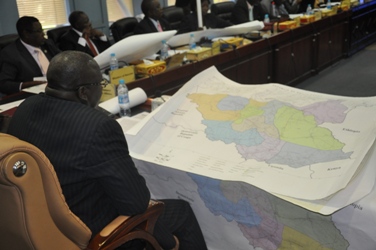Sudan and South Sudan contest 60% of borderline – Machar
May 11, 2012 (JUBA) – The Vice President of South Sudan, Riek Machar said Friday that only 40% of the international border between Sudan and newly-independent South Sudan has been agreed in principle, dismissing Khartoum’s claim that 80% has been agreed.

A peace agreement in 2005 between Khartoum and former rebels the Sudan People’s Liberation Movement (SPLM) did not resolve many of the disputes that triggered or perpetuated the two-decade conflict. Instead it created mechanisms, such as joint committees on borders and contested areas, to find solutions to contentious issues.
However, after six years of sharing wealth and power South Sudan seceded in July 2011 with many of the issues still up in the air, such as the location of the new 1,800km international border and how much landlocked South Sudan would pay Sudan to exports its oil through Northern infrastructure.
The impasse over the border and oil — South Sudan took with its 75% of production when it seceded — have culminated in border clashes over the past two months that have threatened to drag the Sudans back to war. Two million people died in the last conflict, which affected the whole region.
South Sudan has accused Sudan of illegally annexing the Heglig area — known as Panthou in Dinka dialect — in the 1970s after oil was discovered. Khartoum denies this. Sudan also refutes the UN’s reports that Sudan has bombed South Sudan on numerous occasion; over 80 times according to some South Sudan officials. Juba, in turn, denies supporting Sudanese rebels north of the border.
Addressing a conference in Torit, capital of Eastern Equatoria on Thursday during the launch of a development and investment plan for the state, South Sudan’s Vice President, Riek Machar, called on youth to prepare for all eventualities over the border conflict with Sudan.
Machar chairs South Sudan’s national mobilisation committee, which has been recruiting young men into the country’s armed forces in case the relatively localised fighting spreads along the tense and highly militarised border.
Sudan has also put its border areas on a war footing, declaring a state of emergency on all states bordering South Sudan and launching nationwide recruitment campaigns for its army and paramilitaries.
Machar said that even before Southern secession, during the six year interim period of the 2005 Comprehensive Peace Agreement, Khartoum had been forcefully encroaching into the territories of South Sudan.
The semi-autonomous government in South Sudan had not forcefully responded during interim period, Machar said, because it did not want to jeapordise the region’s January 2011 self determination referendum.
He asserted that South Sudan was under attack by the Sudan Armed Forces, which were trying to annex South Sudanese territories.
Machar reiterated his government’s quest for a peaceful solution to the demarcation of the borders, but added that the new country has the right to self-defense and can respond in kind should Sudan continue it’s aggression.
He called on Eastern Equatoria State to mobilise both human and material resources for the front line, emphasing the importance of morale in supporting the national army.
The world’s youngest state adopted its new map on 4 May incorporating all five disputed the areas that are disputed with Sudan, as well as Heglig/Panthou.
On Friday the cabinet adopted the new official map, which replaced the Arabic names given by the Khartoum government with “indigenous” names, according to South Sudan’s official spokesman, Barnaba Marial Benjamin.
Khartoum has a rival map which claims the same territories. Sudan claims that Juba is illegally occupying the areas.
Officials of the newly independent country say they have documents which prove the ownership of the areas, confident that they would win the case in an international tribunal. Khartoum, has rejected turning the matter over to a tribunal.
Sudan’s ambassador to the United Kingdom has said Khartoum would be willing to go for arbitration if certain security measures are met, however, it is unclear that this represents an official change of policy.
South Sudan has accused Khartoum of defying resolution 2046 of the United Nations Security Council, which seeks peaceful resolution of the border conflict, by carrying out fresh aerial bombardments covering the three states of Upper Nile, Unity and Western Bahr el Ghazal.
Khartoum has said that it will not return to talks until Juba admits that it supports Sudanese rebels the Sudan People’s Liberation Movement – Northern Sector. Ceasing backing of rebels in the other’s territory was another demand of the UNSC resolution.
(ST)
